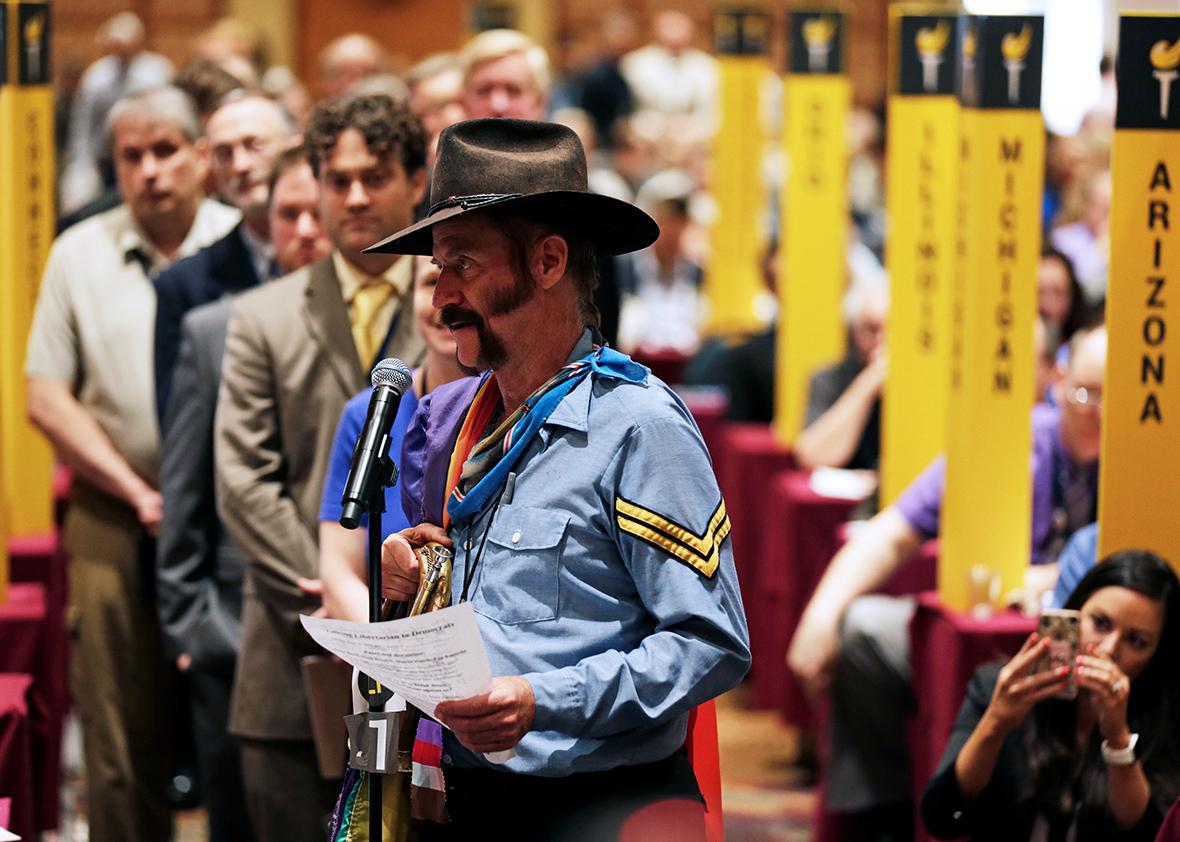This article appears in slightly different form in the Financial Times.
The Libertarian Party’s nominating convention, held last weekend in Orlando, Florida, was typical of its gatherings. One of its more popular presidential candidates, software magnate John McAfee, is wanted for questioning by the police in Belize as a “person of interest” in connection with his neighbor’s murder. Another candidate, who goes by the name of Vermin Supreme, wore a rubber boot on his head while explaining his platform of time travel, self-defense against zombies, and free ponies for all.
It is all good fun, if observed from a safe distance. But, unlike in previous elections, the Libertarians do not have to be a total joke this time around—they have an unprecedented opportunity to play an actual role. Republicans with any moral sense are desperate for a supportable alternative to Donald Trump.
Libertarianism, the political philosophy of rugged individualism, ought to hold a natural appeal to tolerant, anti-statist, free-trade conservatives who deplore the turn taken by the party of Abraham Lincoln toward racial prejudice, authoritarianism, and mercantilism.
Libertarians also happen to have crucial infrastructure in place for the “never Trump” crowd: probable ballot placement in all 50 states, alongside Democrats and Republicans.
In Orlando, the Libertarians ended up nominating the most mainstream candidates on offer: former New Mexico Gov. Gary Johnson for president and former Massachusetts Gov. Bill Weld for vice president. Both are affable, reasonable-seeming politicians with governing experience. Yet the party is poised to remain entirely marginal this year. Why can it not harness the Jeffersonian instinct for individual liberty, even in a year when the leading parties have put forward the most disliked nominees in memory?
The problem starts, of course, with the Libertarians themselves—a Halloween parade of cryptocurrency enthusiasts and conspiracy nuts of every permutation. These eccentrics regard their party not as an expanding tent but as a private playground for diffuse forms of self-expression.
People who devote their greatest passion to the cause of legalizing drugs, challenging the age of consent, and removing limitations on the ownership of fully automatic weaponry are not really in the business of attracting a broader following. As a political party, the Libertarians have always been more party than political.
Beyond the adolescent antics, their difficulty is at the level of ideas. Today’s Libertarians are not so much extreme left or extreme right as they are lost in the clouds of utopian anarchism. Their platform calls for the abolition of government-funded schools and state-sanctioned marriage. During their nominating debate, delegates booed Johnson for endorsing the Civil Rights Act of 1964.
Like academic Marxists, who are their sisters under the skin, libertarians are far more interested in an ideal world than in the one where ordinary humans live. They regard the failure of policies they support, such as the self-regulation of financial markets in the 2008 crisis, as evidence that government still managed to play some corrupting role. When facts come into conflict with theory, they reject the facts.
The failure of any libertarian state to ever actually exist anywhere in the world supports their faith that it would all work only if it could be tried. To a country beset by rising inequality, stagnant wages and the hollowing out of the middle class, libertarians have literally nothing to say.
And in a way the party is right to mistrust supporters who have compromised their principles by moving into mainstream politics. David Koch, the party’s nominee for vice president in 1980, has become with his brother Charles the American face of oligarchy. For the Koch brothers, libertarianism became a convenient guise for the economic interests of their family oil and gas conglomerate. Though the Kochs are thus far staying aloof from Trump, they have been generous patrons of climate-change denial and moralizing evangelical Republicans.
A somewhat different style of libertarianism flourishes in Silicon Valley, where it meets the feeling of the rich and immature that Washington should leave them alone. The leading exemplar of this set is Peter Thiel, the billionaire co-founder of PayPal and a Trump delegate to the Republican convention.
Thiel contends that extending the franchise to women in the 1920s destroyed American capitalism. He helped found the Seasteading Institute, an organization devoted to creating a law-free floating community in the middle of the ocean. More recently, Thiel has been exposed as the financier of a libel suit against Gawker Media that threatens the free press.
In practice, wherever libertarianism has moved beyond the defense of sexual perversity and antisocial behavior, it has revealed itself as a mask for self-
interest and the abuse of economic power.
This is a shame, because an intellectually coherent alternative to the Republican party, grounded in the principled restraint of classical liberalism, has never been more wanted.
